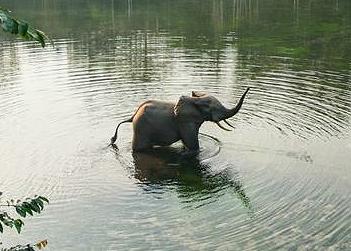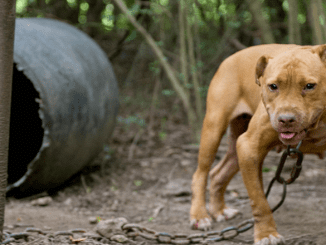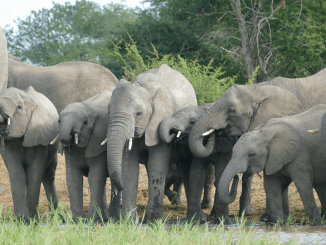
BRAZZAVILLE, Republic of Congo, August 22, 2020 (ENS) – A criminal court in the Republic of Congo has sentenced a notorious poacher and ivory trafficker, Mobanza Mobembo Gérard, alias Guyvanho, to 30 years in prison for the attempted murder of park rangers, trafficking of ivory from poached elephants, possession of military weapons, and other charges. He is also required to pay damages of 38 million Central African Francs (US$68,000) to the injured rangers.
The 30-year sentence marks the first-ever conviction in the criminal courts of a wildlife trafficker in the Republic of Congo.
Investigations revealed that Guyvanho led a group of approximately 25 poachers who, based on the number of hunts reported, could have killed upwards of 500 elephants in the area of Nouabalé-Ndoki National Park since 2008.
Established in 1993, in the northern provinces of Congo, the park is inhabited by forest elephants and rare great apes, including western lowland gorillas and the eastern subspecies of chimpanzees.
In early 2018, Guyvanho – a citizen of the Democratic Republic of Congo who had arrived in the northern Republic of Congo around 2008 – and several other members of his team were caught in an operation led by Nouabalé-Ndoki National Park rangers, after they allegedly killed 11 elephants. A firefight ensued and Guyvanho was initially able to escape, but three members of his team were arrested. Their statements provided sufficient grounds for an arrest warrant to be issued against him.

In addition to the number of elephants killed, this incident demonstrated the willingness of this group to respond with violence when challenged. This was indicative of a trend of increasing violence of elephant poaching gangs in and around the park.
In May 2018, Guyvanho was arrested and remanded in prison in the provincial town of Ouesso to await trial. However, on June 2, 2018, 12 days before his trial was to take place, Guyvanho escaped from the Ouesso prison. Still, his trial went ahead, and he was sentenced in absentia to five years in prison with a five million Central African Franc (US$9,000) fine.
A further arrest warrant was issued. He remained a priority target of the park’s Wildlife Crime Unit – and locations known to be used by Guyvanho were monitored, but no arrest was made.
During this time, he was cited as a participant in a number of subsequent hunts, each of which featured exchanges of gunfire with park rangers.
On May 31, 2019, a ranger patrol returning to Nouabalé-Ndoki National Park HQ happened across a group of poachers – including Guyvanho – returning from a hunt. The patrol was fired upon by the poachers, and two patrol members were wounded, one of them seriously. His life was saved by fellow rangers with medical training.

Guyvanho was again able to escape but was reported to have bragged about the incident. This information was passed to the authorities along with a new location for Guyvanho’s home. A surveillance operation was launched to confirm the information from the Wildlife Crime Unit, and, based on this information, Guyvanho was arrested by the Ouesso Police on July 20, 2019.
Guyvanho was returned to prison in Ouesso to serve his sentence but following a further escape attempt, this time unsuccessful, it became clear that Guyvanho had a sufficiently strong support network in Ouesso that another escape attempt was highly likely. A transfer to Brazzaville prison was requested by the park authorities and approved, and in August 2019 Guyvanho and three associates were successfully moved.
All the convicts will be transferred back to Brazzaville this week to serve their sentences.
The Nouabalé-Ndoki National Park is governed by a 25-year public-private partnership between the New York City-based Wildlife Conservation Society, WCS, and the Government of the Republic of Congo through the Nouabalé-Ndoki Foundation.
Dr. Emma Stokes, WCS regional director for Central Africa, says many people cooperated to bring this poacher to justice. “The sentencing is the culmination of more than three years of work by the Nouabalé-Ndoki National Park’s Wildlife Crime Unit and Anti-Poaching department. It is also the result of fruitful cooperation with multiple Congolese authorities, including the Ministry of Forest Economy, the Police, and District Prosecutors.
Dr. Stokes listed some of those supporting WCS involvement in this case. “WCS commends our government partners in the Republic of Congo and thanks our donors for their ongoing support in this case, including The Wildcat Foundation, Save the Elephants’ and Wildlife Conservation Network’s Elephant Crisis Fund, the Sangha Trinational Trust Fund, U.S. State Department’s Bureau for International Narcotics and Law Enforcement Affairs, the European Union, and the United States Agency for International Development’s Central Africa Regional Program for the Environment (USAID-CARPE).”
“This unprecedented conviction in the criminal court is a major milestone in the protection of wildlife in the Republic of Congo. Previously, all environmental crimes were tried in the civil courts where the maximum penalty under the wildlife law was five years. Today’s sentencing sends an extremely strong message that wildlife crime will not be tolerated and will be prosecuted at the highest levels,” Stokes said.
“We are confident that today’s sentence will serve as a deterrent to would-be criminals that you will serve hard time if you break our wildlife laws and put park rangers and Congo’s national security in danger,” she said.
After the sentencing, an official from the Sangha District Court declared, “This verdict confirms the fact that under the pretext of being poaching gangs, it is actually well-organized criminal gangs operating in our forests.”
Copyright Environment News Service (ENS) 2020. All rights reserved.
© 2020, Environment News Service. All rights reserved. Content may be quoted only with proper attribution and a direct link to the original article. Full reproduction is prohibited.



